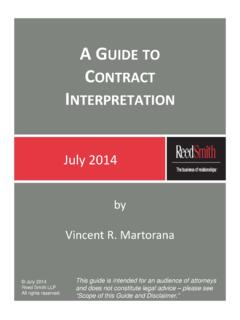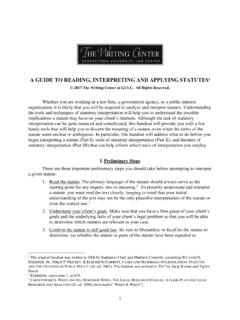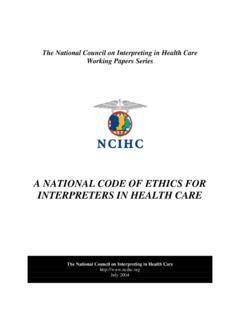Transcription of DRAFTING AND INTERPRETING GOVERNING LAW AND …
1 DRAFTING AND INTERPRETING GOVERNING LAW AND JURISDICTION. CLAUSES A PRACTICAL guide . 1. Introduction 2. GOVERNING law a. guide to GOVERNING law clauses b. Choosing a GOVERNING law 3. Jurisdiction a. Litigation or arbitration? b. One-way jurisdiction clauses c. Multi-tiered dispute resolution clauses d. Complex transactions e. DRAFTING tips 4. DRAFTING an effective arbitration clause a. Introduction to DRAFTING an arbitration clause b. Key issues c. DRAFTING tips 1. INTRODUCTION. When DRAFTING a contract, typically only a cursory glance is given to the GOVERNING law and jurisdiction provisions which form part of the boilerplate clauses at the end of the contract.
2 However, to give these clauses such little attention is to underestimate the vital role they play in, firstly, identifying the nature and scope of the rights and obligations of the parties to the contract; and secondly, how disputes over those rights and obligations are to be resolved. It is important to ensure that every contract no matter how brief or apparently straightforward contains clear and comprehensive versions of each of these clauses. A. failure to include any provisions on GOVERNING law and jurisdiction, or the inclusion of unclear and contradictory provisions, can lead to complex, lengthy and therefore expensive disputes over the GOVERNING law and dispute resolution procedures to be applied to a contract.
3 This was summed up in the English High Court case of Apple Corps Ltd v Apple Computer Inc. [2004] EWHC 768 (Ch), in which Mann J said: The evidence before me showed that each of the parties was overtly adamant that it did not wish to accept the other's jurisdiction or GOVERNING law, and could reach no agreement on any other jurisdiction or GOVERNING law. As a result, [the relevant agreement] contains no GOVERNING law clause and no jurisdiction clause. In addition, neither party wanted to give the other an advantage in terms of where the agreement was finalised. If their intention in doing so was to create obscurity and difficulty for lawyers to debate in future years, they have succeeded handsomely.
4 1. This paper will identify key considerations relating to GOVERNING law and jurisdiction clauses, practical DRAFTING tips, and guidance on how the courts will interpret these clauses (or the lack of such clauses) by reference to recent decisions of the English courts and others. 2. GOVERNING LAW. (a) guide to GOVERNING law clauses The GOVERNING law clause identifies the substantive law that will govern the rights and obligations of the parties to the contract. Sample clause: This agreement and any dispute or claim arising out of or in connection with its subject matter or formation (including non-contractual disputes or claims) shall be governed by and construed in accordance with the law of England and Wales.
5 Most legal systems will uphold an express choice of GOVERNING law by the parties. (Note that for contracts made on or after 17 December 2009 where one or more of the parties to the contract is based in the European Union, the Rome I Regulation applies which will (with some limited exceptions) uphold the choice of law by the parties; in the absence of any such choice the GOVERNING law will be determined in accordance with the provisions of that Regulation). However, in order for a GOVERNING law clause to be upheld, it is important to be precise as to the law which is chosen and ensure that an effective GOVERNING law is selected.
6 For example: while some contracts have attempted to select the laws of the United Kingdom as their GOVERNING law, this leads to difficulties as the laws of the United Kingdom in fact encompass the laws of several countries, including English law and Scottish law, which contain some marked differences (particularly in relation to contract law). some jurisdictions will only uphold a GOVERNING law that is the law of a country and not a non-national system of law in Beximco Pharmaceuticals Ltd v Shamil Bank of Bahrain EC [2004] EWCA Civ 19, the English Court of Appeal rejected a GOVERNING law clause which provided that Subject to the principles of the Glorious Sharia'a, this Agreement shall be governed by and construed in accordance with the laws of England , and instead held that the only applicable GOVERNING law was English law.
7 The choice of GOVERNING law can be of great significance different legal systems will have different rules on, for example, formation of a contract, methods of terminating a contract, availability of damages, and rights of third parties. A failure to choose a GOVERNING law clause can lead to uncertainty for the parties as to which law will be applied to the contract, and can result in costly and lengthy disputes. 2. (b) Choosing a GOVERNING law Choosing the GOVERNING law of a contract can be a complex affair, particularly where the transaction which is the subject of the contract is of an international nature.
8 For example, where a party based in Qatar headquartered in the USA enters into a contract with a company in England to provide goods/services obtained from Switzerland to Oman, there are a number of potential choices of GOVERNING law. To help parties choose the most appropriate GOVERNING law, the following factors should be considered: where are the parties based, and, if different, where is the contract to be performed? where have the parties selected as the jurisdiction for the resolution of disputes? Typically, the GOVERNING law should be the same to avoid complexity although this is by no means essential - courts which deal with international disputes regularly are experienced in applying foreign law to a dispute.
9 While this will increase costs as it will require expert evidence on foreign law issues, it can be an acceptable compromise. with which legal system and laws are the parties to the contract most familiar? would the application of a particular GOVERNING law be more favourable to one party than the application of another GOVERNING law? does the proposed GOVERNING law recognise the subject matter/key aspects of the contract? For example, while some legal systems such as England recognise the existence of a trust , or accept that property can be owned by different parties legally and beneficially, other legal systems will not.
10 3. JURISDICTION. The jurisdiction (or dispute resolution ) clause identifies how and where disputes arising from the contract are to be determined. In the event of any difficulties in determining this (for example, where such a clause has not been included, or there are difficulties in INTERPRETING it), this must be resolved before the substantive dispute can be determined. Such a determination can be a lengthy and costly process, and it is therefore important to ensure that an effective jurisdiction clause is included at the outset. (a) Litigation or arbitration? Firstly, the parties must decide whether disputes should be resolved by litigation or arbitration, or some other method.







